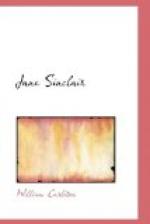them the dewy stillness of evening descended with
tender serenity, as the valley shone in the radiance
of the sinking sun; and by them was held that sweet
and rapturous communion with nature, which, as it
springs earliest in the affections so does it linger
about the heart when all the other loves and enmities
of life are forgotten. Who is there, indeed,
whose spirit does not tremble with tenderness, on
looking back upon the scenes of his early life?
And, alas! alas! how few are there of those that are
long conversant with the world, who can take such
a retrospect without feeling their hearts weighed down
by sorrow, and the force of associations too mournful
to be uttered in words. The bitter consciousness
that we can be youthful no more, and that the golden
hours of our innocence have passed away for ever, throws
a melancholy darkness over the soul, and sends it
back again to retrace, in the imaginary light of our
early time, the scenes where that innocence had been
our playmate. Let no man deny that groves, and
meadows, and green fields, and winding streams, and
all the other charms of rural imagery, unconsciously
but surely give to the human heart a deep perception
of that graceful creed which is beautifully termed
the religion of nature. They give purity and strength
to feeling, and through the imagination, which owes
so much of its power to their impressions, they raise
our sentiments until we feel them kindled into union
with the lustre of a holier light than even that which
leads our steps to God through the beauty of his own
works. For this reason it is, that all imaginative
affections are much stronger in the country than in
the town. Love in the one place is not only freer
from the coarseness of passion, but incomparably more
seductive to the heart, and more voluptuous in its
conception of the ideal beauty with which it invests
the object of its attachment. Nor is this surprising.
In the country its various associations are essentially
impressive and poetical. Moonlight—evening—the
still glen—the river side—the
flowery hawthorn—the bower—the
crystal well—not forgetting the melody of
the woodland songster—are all calculated,
to make the heart and fancy surrender themselves to
the blandishments of a passion that is surrounded
by objects so sweetly linked to their earliest sympathies.
But this is not all. In rural life, neither the
heart nor the eye is distracted by the claims of rival
beauty, when challenging, in the various graces of
many, that admiration which might be bestowed on one
alone, did not each successive impression efface that
which went before it. In the country, therefore,
in spring meadows, among summer groves, and beneath
autumnal skies, most certainly does the passion of
love sink deepest into the human heart, and pass into
the greatest extremes of happiness or pain. Here
is where it may be seen, cheek to cheek, now in all
the shivering ecstacies of intense rapture, or again
moping carelessly along, with pale brow and flashing
eye, sometimes writhing in the agony of undying attachment,
or chanting its mad lay of hope and love in a spirit
of fearful happiness more affecting than either misery
or despair.




